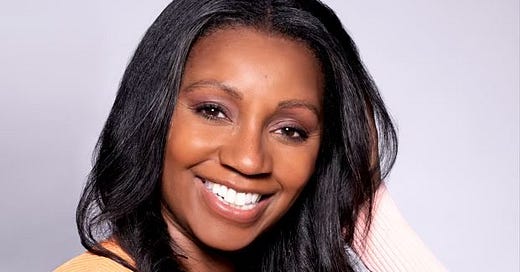"I could not get over how ridiculous and white everything was."
Ten Questions no. 2: Helena Andrews
If someone forwarded this to you, subscribe here! If you want to get in touch, email here!
Read more from our Ten Questions series.
Helena Andrews-Dyer (she/her/hers) is an award-winning culture reporter for The Washington Post. She’s written about actress Sheryl Lee Ralph finally getting her flowers, how DJ D-Nice saved all of our lives, and the significance of Brett and Tiffany’s Black love story on Netflix’s ‘Love is Blind.”
In 2020, Helena was awarded two National Association of Black Journalists’ Salute to Excellence Awards for her longform feature “This Isn’t Another Horror Story About Black Motherhood.”
Her latest book, “The Mamas: What I Learned About Kids, Class and Race From Moms Not Like Me,” was published by Crown in August 2022. With sharp wit and refreshing honesty, The Mamas explores the contradictions and community of motherhood—white and Black and everything—against the backdrop of the rapidly changing world.
Helena’s other works include “Reclaiming Her Time: The Power of Maxine Waters” co-written with R. Eric Thomas and the memoir-in-essays “Bitch is the New Black.” “Grey’s Anatomy” creator Shonda Rhimes optioned “Bitch is the New Black” as a feature film for Fox Searchlight Pictures.
Before joining The Post Helena was a contributing editor at xoJane, a digital women’s magazine founded by Jane Pratt. Helena’s work has appeared in Oprah Magazine, Marie Claire, Glamour, The New York Times, The Washington Post, The Washington Post Magazine, Essence, and OUT among other national publications. Helena has appeared on ABC’s “Good Morning America,” NPR’s “Morning Edition,” CNN, MSNBC, XM Radio, NY1 among other outlets.
She lives in Washington with a husband whose laugh can be heard for miles and two equally carefree daughters.
What inspired you to tell this story?
“The Mamas” was born out of hilarity, frustration, and new mom exhaustion. When I had my first daughter in 2017 then joined the prison gang otherwise known as my neighborhood mom group, I could not get over how ridiculous and white everything was. Baby yoga? Music class for seven-week-olds? WTF and also sign me up. Since writing is the only way I know how to process things, including my personal struggle with this all consuming new identity, I began writing notes to myself about the entire experience of being an extra Black mom in gentrified spaces. I knew other women were having the same double-take moments but I’d never read anything about it, so I wrote it.
What did you edit out of this book?
Honestly? Not much. I’ve written four books now, including two of my own memoirs, and my literary motto is “leave it all on the page.” But because “The Mamas” features other main “characters” besides myself, most of whom are women on the verge with babies and aging parents and work and who knows what else, I was more careful about how I painted them. Usually I never let anyone read my work (aside from my editor) before it goes to print. But with this book I wanted everyone to feel seen and not exposed. So I let a select group of mom friends take a peek at some chapters and my mother read her chapter. There were no notes! Memoir should be about exposing your own foolishness for the greater good.
How did you know you were done? What did you discover about yourself upon completion?
I plot all my books from start to finish before I dive in for real. My creative dial is permanently set on journalist, so I structure my work like an inverted pyramid – lede, nut graphs, and a kicker. I need to be writing towards something. A story, a book, a script is done once I get my reader over the finish line. Oftentimes writing with that kind of structure always in mind gets a bad reputation as inflexible and less creative. Not true. The journey can still take you places you never imagined. The chapter on my mother, “Your Mom’s Vagina” turned into a rumination on my own daughterhood which I wasn’t expecting until I dove in.
What was your agenting process like?





